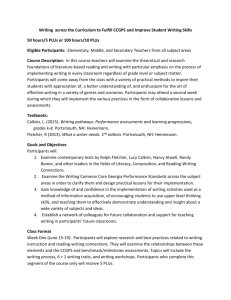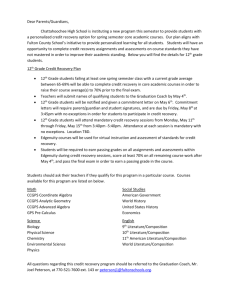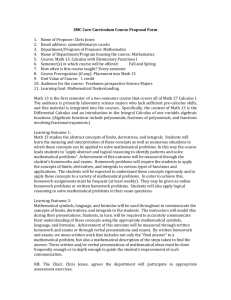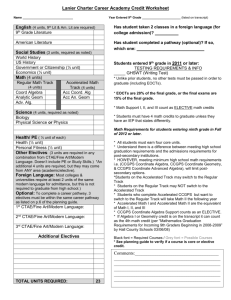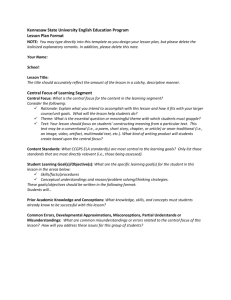CHHS State Math Course Alignment
advertisement
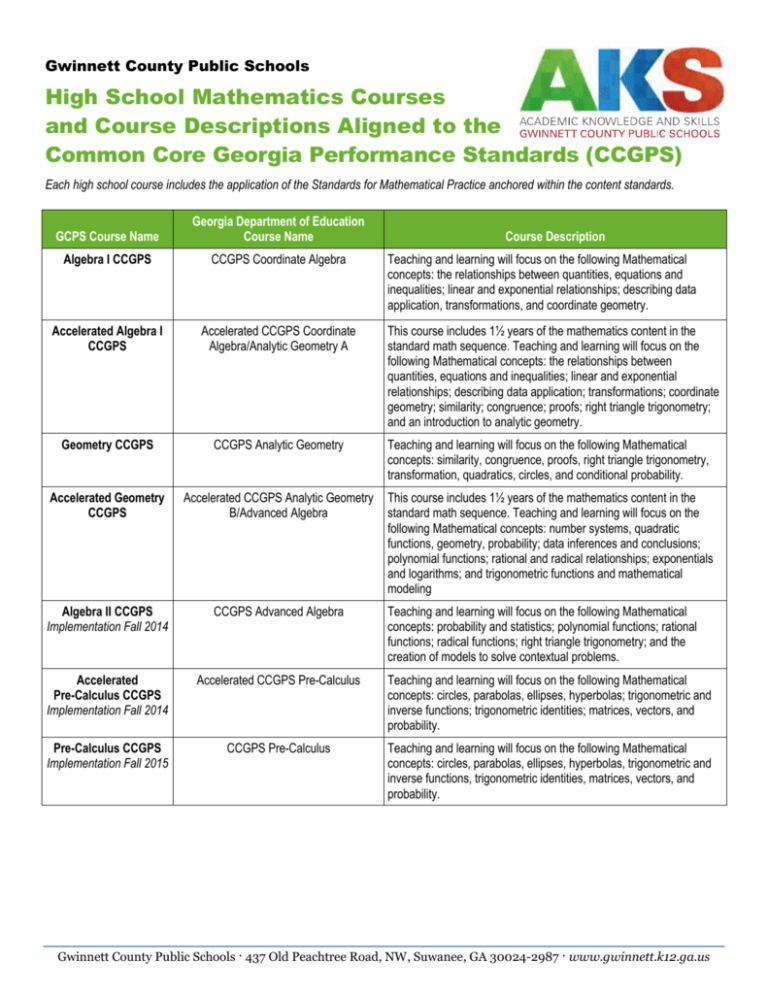
Gwinnett County Public Schools High School Mathematics Courses and Course Descriptions Aligned to the Common Core Georgia Performance Standards (CCGPS) Each high school course includes the application of the Standards for Mathematical Practice anchored within the content standards. GCPS Course Name Georgia Department of Education Course Name Algebra I CCGPS CCGPS Coordinate Algebra Accelerated Algebra I CCGPS Accelerated CCGPS Coordinate Algebra/Analytic Geometry A Geometry CCGPS CCGPS Analytic Geometry Teaching and learning will focus on the following Mathematical concepts: similarity, congruence, proofs, right triangle trigonometry, transformation, quadratics, circles, and conditional probability. Accelerated Geometry CCGPS Accelerated CCGPS Analytic Geometry B/Advanced Algebra This course includes 1½ years of the mathematics content in the standard math sequence. Teaching and learning will focus on the following Mathematical concepts: number systems, quadratic functions, geometry, probability; data inferences and conclusions; polynomial functions; rational and radical relationships; exponentials and logarithms; and trigonometric functions and mathematical modeling Algebra II CCGPS Implementation Fall 2014 CCGPS Advanced Algebra Accelerated Pre-Calculus CCGPS Implementation Fall 2014 Accelerated CCGPS Pre-Calculus Teaching and learning will focus on the following Mathematical concepts: circles, parabolas, ellipses, hyperbolas; trigonometric and inverse functions; trigonometric identities; matrices, vectors, and probability. Pre-Calculus CCGPS Implementation Fall 2015 CCGPS Pre-Calculus Teaching and learning will focus on the following Mathematical concepts: circles, parabolas, ellipses, hyperbolas, trigonometric and inverse functions, trigonometric identities, matrices, vectors, and probability. Course Description Teaching and learning will focus on the following Mathematical concepts: the relationships between quantities, equations and inequalities; linear and exponential relationships; describing data application, transformations, and coordinate geometry. This course includes 1½ years of the mathematics content in the standard math sequence. Teaching and learning will focus on the following Mathematical concepts: the relationships between quantities, equations and inequalities; linear and exponential relationships; describing data application; transformations; coordinate geometry; similarity; congruence; proofs; right triangle trigonometry; and an introduction to analytic geometry. Teaching and learning will focus on the following Mathematical concepts: probability and statistics; polynomial functions; rational functions; radical functions; right triangle trigonometry; and the creation of models to solve contextual problems. Gwinnett County Public Schools · 437 Old Peachtree Road, NW, Suwanee, GA 30024-2987 · www.gwinnett.k12.ga.us GCPS Course Name Georgia Department of Education Course Name Statistical Reasoning Statistical Reasoning Course Description Teaching and learning will focus on the following Mathematical concepts:The course provides experiences in statistics beyond the CCGPS sequence of courses, offering students opportunities to strengthen their understanding of the statistical method of inquiry and statistical simulations. Students will formulate statistical questions to be answered using data, will design and implement a plan to collect the appropriate data, will select appropriate graphical and numerical methods for data analysis, and will interpret their results to make connections with the initial question. Advanced Mathematical Advanced Mathematical Decision Making Teaching and learning will focus on the following Mathematical Decision Making concepts: This course will give students further experiences with Implementation Fall 2014 statistical information and summaries; methods of designing and conducting statistical studies; an opportunity to analyze various voting processes; modeling of data; basic financial decisions; and use network models for making informed decisions. AP Statistics AP Statistics AP Statistics introduces students to the major concepts and tools for collecting, analyzing and drawing conclusions from data. Teaching and learning will focus on the following Mathematical concepts: Exploring Data - Describing patterns and departures from patterns; Sampling and Experimentation - Planning and conducting a study; Anticipating Patterns - Exploring random phenomena using probability and simulation; and Statistical Inference - Estimating population parameters and testing hypotheses. AP Calculus AB AP Calculus AB The course emphasizes a multi-representational approach to calculus with concepts, results, and problems being expressed graphically, numerically, analytically, and verbally. Teaching and learning will focus on the following Mathematical concepts: Functions, Graphs, and Limits; Analysis of graphs; Limits of functions (including onesided limits); Asymptotic and unbounded behavior; Continuity as a property of functions; Concept of the derivative; Derivative at a point; Derivative as a function; Second derivatives; Applications of derivatives; Computation of derivatives; Interpretations and properties of definite integrals; Applications of integrals; Fundamental Theorem of Calculus; Techniques of anti-differentiation; Applications of antidifferentiation; and Numerical approximations to definite integrals. AP Calculus BC AP Calculus BC The course emphasizes a multi-representational approach to calculus with concepts, results, and problems being expressed graphically, numerically, analytically, and verbally. Teaching and learning will focus on the following Mathematical concepts: Functions, Graphs, and Limits; Analysis of graphs.; Limits of functions (including onesided limits); Asymptotic and unbounded behavior; Continuity as a property of functions; Parametric, polar, and vector functions; Concept of the derivative; Derivative at a point; Derivative as a function; Second derivatives; Applications of derivatives; Computation of derivatives; Interpretations and properties of definite integrals; Applications of integrals; Fundamental Theorem of Calculus; Techniques of antidifferentiation; Applications of antidifferentiation; Numerical approximations to definite integrals; Polynomial Approximations and Series; Concept of series; Series of constants; and Taylor series.
